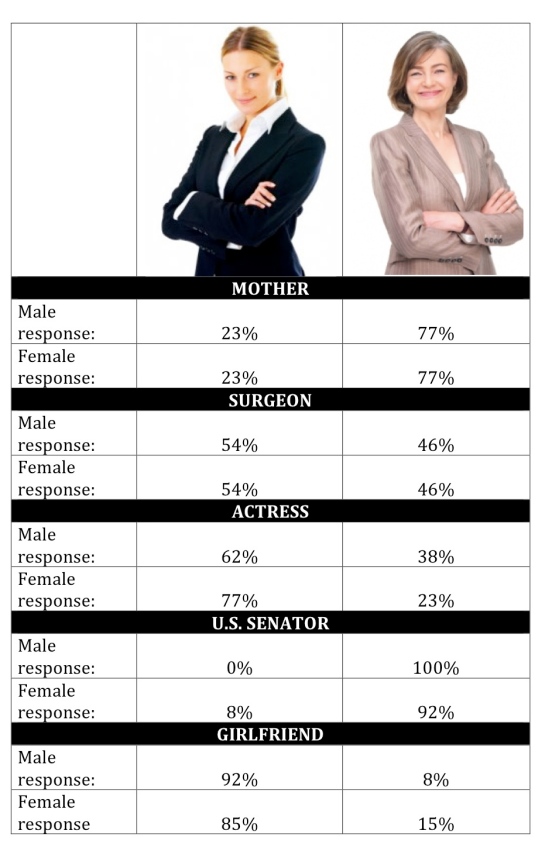Predictably confused: Why we like our Senators old, our girlfriends young, and really any surgeon at all
When it comes to snap judgments, men and women may be more similar than they think.
In a survey I conducted this week near NYU, modeled on those performed by Dan Ariely and his team in Ariely’s book, Predictably Irrational, I showed thirty men and thirty women pictures of two women and asked them to decide which woman was better at each of five roles.
The two women were both results of a Google Image search for “businesswoman.” They were of simliar body type, and dressed nearly alike. The only striking difference was that one woman had grey hair, and appeared to be in her fifties, while the other woman appeared to be in her twenties or thirties.
Of the roles I chose–mother, surgeon, actress, U.S. Senator, and girlfriend–only one, actress, might have a significant professional benefit associated with youth (though it would hardly be a guarantee of skill.) A person has to be 30 years old to become a U.S. Senator, and either woman could meet that requirement. A surgeon might benefit from more years on the job. Finally, a woman can really be a mother or girlfriend–for better or worse–at any age.
The results showed that while few of the decisions made rational sense, men and women were in general agreement.
The thing I found particularly fascinating about these results is that none of these questions has a clear correct answer, or even a totally logical inferred response, and so a “rational” sample group, by Ariely’s parameters, would have simply picked the woman they had the best feeling about and the answers would have been all over the map based on the feelings of thirty individuals.
Instead, people of both genders demonstrate some clear preferences:
- Older women are better mothers–men and woman surveyed are in 100% agreement on this
- Either woman could be the better surgeon. This surprised me, since it seems logical to me that given the number of years it takes to complete medical school, and the highly skilled nature of the profession, an older surgeon might be a better surgeon. (I blame medical dramas for skewing our logical perceptions.)
- Either woman could be the better actress, though both groups slightly prefer the younger. I had expected men in this case to choose the younger woman, and women to choose the older. Instead they choose similarly, with women preferring the younger actress in even greater numbers.
- We like our elected officials older: the older woman won her Senate campaign by a–unanimous, in the case of male voters–landslide.
- Both men and women think younger women make better girlfriends.
Perhaps even more interesting than people’s statistical responses were the behaviors they displayed while completing the survey. In mixed gender groups who completed the survey simultaneously, the women would usually indicate a special interest in the men’s responses–though we now see they were similar to their own! A group of Asian undergrads told me the older woman looked “like a tiger mom.”
A few Ph.D. students told me the experiment was poorly designed (duly noted!). Some Freshmen told me it was “deep.” Since I conducted this survey outside of NYU buildings during evening classes, there is almost no way of knowing how non-smokers would have responded.

A number of people told me the survey format was confusing. This was my favorite “freestyle” response.
Most surprising was that several people told me the survey itself was “weird” or “offensive.” I thought this odd, since we can infer these people go through daily life making visual assessments of women–we all do–and data to this effect seems no more offensive than the mental process itself. Several women refused to participate.
Ultimately, what unified all the data was its adherence to Ariely’s principles–there was no way to expect a pattern, except to prepare for the unexpected.
(Something to remember the next time a 30-year old is removing your gallbladder.)
